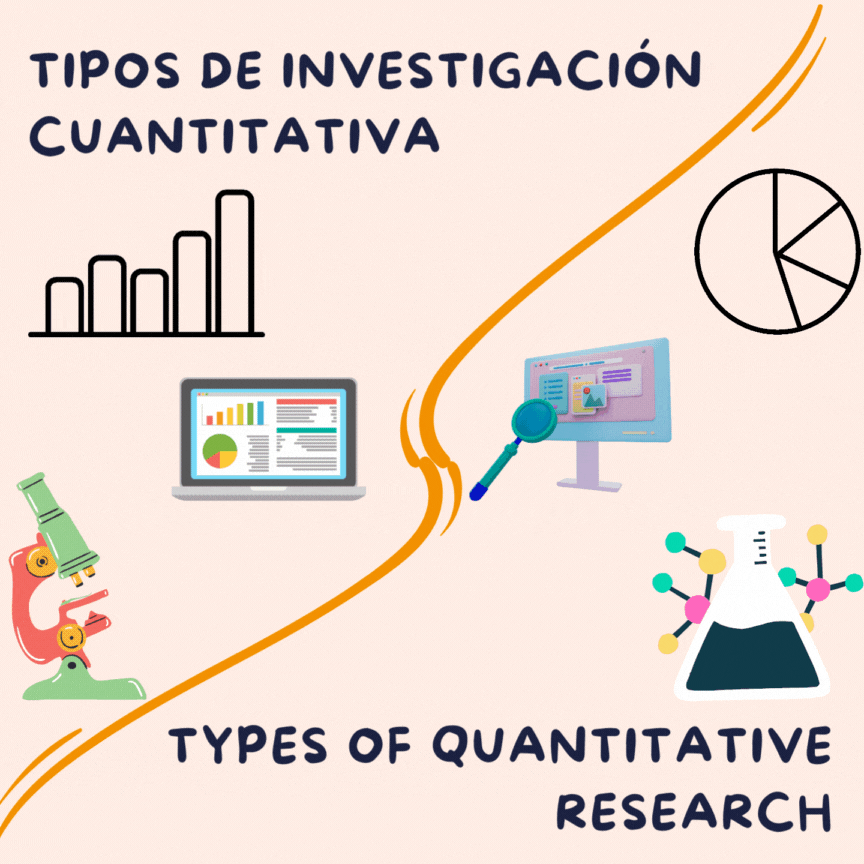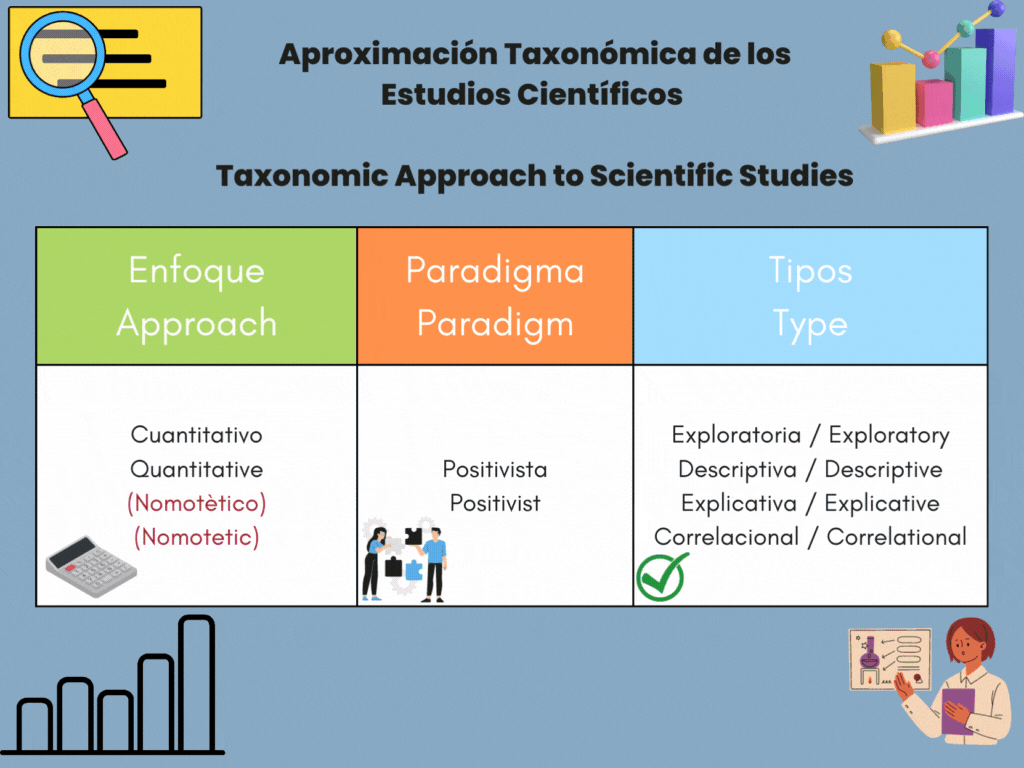Let's learn a little about the types of quantitative research // Aprendamos un poco sobre los Tipos de Investigación Cuantitativa
10 comments
Hello dear hive community! 😉
¡Hola querida comunidad de hive! 😉
When we decide to undertake a scientific research, the first thing we must do is to choose a topic, almost always comes from a situation that worries us and that leads us to a question: What do we want to investigate? In order to answer this question, we need to set out a path to follow, which is why it is useful to know a little about the types of quantitative research.
Cuando decidimos emprender una investigación científica, lo primero que debemos hacer es elegir una temática, casi siempre proviene de una situación que nos inquieta y que nos lleva a una interrogante ¿Qué queremos investigar? Para responder esta pregunta necesitamos entablar un camino a recorrer es por eso que resulta propicio conocer un poco sobre los tipos de investigación cuantitativa.

Imagen realizada con la página web de diseño gráfico y composición de imágenes Canva // Image made with the graphic design and image composition website Canva.

If we have already decided on a topic and what we want to do, we will choose an approach; if it is quantitative, there are a number of types of research. It is very important that we reflect on the scope that our research will have, since the strategies to be used will depend on this; from here the components, process and design will be different for each type of intervention, among which are exploratory, descriptive, correctional or explanatory works, although in the construction of the work, elements of more than one type of research can be included.
Si ya nos hemos decidido una temática y que es lo que queremos hacer vamos a elegir un enfoque; si se trata del cuantitativo existen una serie de tipos de investigación. Es muy importante que reflexionemos sobre el alcance que tendrá nuestra investigación, ya que de esto dependerán las estrategias a utilizar; partiendo de aquí los componentes, el proceso y el diseño serán diferentes para cada tipo de intervención, entre los que están los trabajos exploratorios, descriptivos, correccionales o explicativos, aunque en la construcción del trabajo, se pueden incluir elementos de más de un tipo de investigación.

Source
Now, the first scope of research presented to us is exploratory; it is used when the topic we want to focus on is little studied and therefore there is not much background, but they are background for descriptive research. Arias (2012) defines it as "that which is carried out on an unknown or little studied subject or object, so that its results constitute an approximate vision of said object, that is, a superficial level of knowledge".
This means that exploratory research is like a journey into an unknown universe, but its purpose is to arrive at a more precise formulation of a specific topic. Given the lack of information and previous studies, it may happen that the formulation of the problem is a little imprecise; the aim is to obtain new data that can lead us to construct more precise research questions. Another important aspect to know about the exploratory scope is that the object of study is unknown and therefore it is complicated to formulate hypotheses, the central function of exploratory research is to discover the origin and to collect the necessary information that leads us as a result of the study, a clear formulation of hypotheses.
But, which topics can be exploratory? New diseases such as Covid-19, of which there was no relevant information and the investigations for the construction of vaccines were unpublished and are still not so precise. Another topic could also be the current studies on injectable tissue engineering, since they are intended to completely replace organ transplants, but it has not yet been possible to arrive at an accurate hypothesis; or even life expectancy outside the planet earth, a topic on which there is still insufficient information.
Ahora bien el primer alcance de investigación que se nos presenta es la exploratoria; ella se utiliza cuando el tema en el que nos queremos enfocar es poco estudiado y por ende no se presentan muchos antecedentes, pero ellos si son antecedentes para investigaciones de tipo descriptivo. Arias (2012) la define como “aquella que se efectúa sobre un tema u objeto desconocido o poco estudiado, por lo que sus resultados constituyen una visión aproximada de dicho objeto, es decir, un nivel superficial de conocimientos”.
Esto quiere decir que las investigaciones exploratorias son como un viaje a un universo desconocido, pero tienen como finalidad llegar a una formulación más precisa en un tema específico. Dado a que carecen de información y estudios previos puede ocurrir que la formulación del problema sea un poco imprecisa; mediante ella lo que se trata es de obtener nuevos datos que nos puedan llevar a construir con mayor precisión preguntas de investigación. Otro aspecto importante de conocer acerca del alcance exploratorio, es que el objeto de estudio es desconocido y por ende resulta ser complicado formular hipótesis, la función central de la investigación exploratoria es descubrir el origen y poder recolectar la información necesaria que nos conlleve como resultado del estudio, una formulación clara de hipótesis.
Pero, ¿Qué temas pueden ser de tipo exploratorio? Enfermedades nuevas como el Covid-19, de la cual no se tenía información relevante y las investigaciones para la construcción de las vacunas fueron inéditas y aun no son tan precisas. Otro tema, también puede ser los actuales estudios sobre ingeniería inyectable de tejidos, ya que con ellos se pretende sustituir por completo los trasplantes de órganos, pero aun no se ha podido llegar a una hipótesis certera; o incluso la esperanza de vida, fuera del planeta tierra, tema del que aun no hay información suficiente.

Source
The second scope is descriptive, as its name implies, it tries to describe the current state of a phenomenon, situation or context. Hernández, Fernández and Baptista (2014) state that descriptive research "seeks to specify the properties, characteristics and profiles of persons, groups, communities, processes, objects or any other phenomenon that is subjected to analysis". This means that this type of research only focuses on measuring and collecting information independently or jointly on the variables or associated concepts; its purpose is not centered on studying how they are related.
In descriptive studies, each variable or principle is analyzed independently or autonomously, which is why an important characteristic is that no hypotheses are formulated, but there is the presence of variables. What can be descriptive research? One of them is the study of the socioeconomic characteristics of a given population; another descriptive topic could be the motivation for the practice of teaching, or the school dropout rate.
El segundo alcance es el descriptivo, como su nombre lo dice trata de describir el estado actual de un fenómeno, una situación o contexto. Hernández, Fernández y Baptista (2014) establecen que la investigación de tipo descriptiva “busca especificar las propiedades, las características y los perfiles de personas, grupos, comunidades, procesos objetos o cualquier otro fenómeno que se someta a un análisis”. Esto quiere decir, que este tipo de investigación solo se enfoca en medir y recabar información de manera independiente o conjunta de las variables o conceptos asociados, su finalidad no se centra en estudiar cómo se relacionan éstas.
En los estudios descriptivos, cada variable o principio se analiza de manera independiente o autónoma, es por ello, que una característica importante es que no se formulan hipótesis, pero si existe la presencia de variables. ¿Cuáles pueden ser investigaciones de tipo descriptiva? Una de ellas es el estudio de las características socioeconómicas de un determinada población; otro tema de tipo descriptivo puede ser, la motivación el ejerció de la práctica docente, o la tasa de deserción escolar.

The third scope is explanatory research, which consists of studying the causal relationships of a specific phenomenon, whereby causal hypotheses are formulated. Arias (2012) defines it as
Explanatory research is responsible for seeking the reason for the facts by establishing cause-effect relationships. In this sense, explanatory studies can deal with both the determination of causes (post facto research) and effects (experimental research), by testing hypotheses. Their results and conclusions constitute the deepest level of knowledge.
Analyzing the author's definition, we can say that explanatory studies go further than descriptive ones; they actually seek to establish relationships between concepts, since they are aimed at answering for the causes of phenomena, which may be physical or social. As its name certifies, its objective is focused on explaining why the facts occur and under what conditions. If we analyze some of the examples given in descriptive research, there are the socioeconomic characteristics of a given population, but an explanatory study would seek the causes of these characteristics; another descriptive example could be the presence of school dropout, but an explanatory research would focus on investigating the causes; or research on the factors that influence the demotivation of teachers in the exercise of their teaching practice.
Como tercer alcance tenemos las investigaciones explicativas, las cuales consisten en estudiar las relaciones de causalidad de un fenómeno en específico, por lo que se formulan hipótesis causales. Arias (2012) la define como
La investigación explicativa se encarga de buscar el porqué de los hechos mediante el establecimiento de relaciones causa-efecto. En este sentido, los estudios explicativos pueden ocuparse tanto de la determinación de las causas (investigación post facto), como de los efectos (investigación experimental), mediante la prueba de hipótesis. Sus resultados y conclusiones constituyen el nivel más profundo de conocimientos.
Analizando un poco la definición del autor, podemos decir que, los estudios de tipo explicativos van más allá que los descriptivos; en realidad buscan establecer relaciones entre conceptos, ya que van direccionados a responder por las causas de los fenómenos, que pueden ser físicos o sociales. Como su nombre lo certifica, su objetivo se centra en explicar el por qué ocurren los hechos y bajo qué condiciones. Si analizamos algunos de los ejemplos planteados en la investigación descriptiva están las características socioeconómicas de una determinada población, pero en un estudio explicativo buscaría las causas de esas características; otro ejemplo descriptivo podría ser la presencia de la deserción escolar pero una investigación explicativa se centraría en indagar sobre las causas; o investigar sobre los factores que influyen en la desmotivación de los profesores en el ejercicio de la práctica docente.

Source
Lastly, we have correlational research, which focuses on determining how much of a relationship or association may exist between two or more variables. In this type of study, the variables are first measured and then, using correlational hypothesis tests and statistical packages, correlations can be established between the variables. It should be noted that correlational research does not directly establish causal relationships, but it can provide indications of the possible causes of an event. Hernández, Fernández and Baptista (2014) state that:
This type of studies aims to know the relationship or degree of association that exists between two or more concepts, categories or variables in a particular sample or context. Sometimes only the relationship between two variables is analyzed, but often links between three, four or more variables are included in the study.
It should also be noted that correlational studies are independent of descriptive studies, but they do seek to establish the degree of relationship between the variables under study. Some examples of correlational research may be the correlation between school performance and the number of school dropouts; the more attention children receive at home, the better their performance; or the correlational relationship between resilience and labor bournot.
Y por ultimo tenemos las investigaciones correlaciónales, las cuales se centran en determinar qué tanta relación o asociación puede existir entre dos o más variables. En este tipo de estudio, primero se miden las variables, para posteriormente y haciendo uso de pruebas de hipótesis correlacionales y paquetes estadísticos, se puede establecer correlación entre las variables. Cabe destacar, que las investigaciones de tipo correlacional no establecen de forma directa relaciones causales, pero si pueden suministrar indicios de las posibles causas de un acontecimiento. Hernández, Fernández y Baptista (2014) establecen que:
Este tipo de estudios tiene como finalidad conocer la relación o grado de asociación que exista entre dos o más conceptos, categorías o variables en una muestra o contexto en particular. En ocasiones sólo se analiza la relación entre dos variables, pero con frecuencia se ubican en el estudio vínculos entre tres, cuatro o más variables.
De igual manera, es propicio resaltar que los estudios correlaciónales son independientes de los descriptivos, pero si buscan establecer el grado de relación entre las variables de estudio. Algunos ejemplos de investigaciones correlacionales pueden ser la correlación entre rendimiento escolar y número de egresos; a mayor atención de los niños en el hogar mejor será su rendimiento; o relación correlacional entre la resiliiencia y bournot laboral.

Source
Finally, we can conclude that exploratory research can be considered as unpublished, but there are many doubts about the formulation of hypotheses; on the other hand, descriptive research is not considered as deep as it only seeks to describe a phenomenon without trying to go deeper into the subject; explanatory research does seek the cause-effect relationship, i.e. it describes the phenomenon but studies its causes and why, and finally there are correlations that focus on the relationship between variables.
Finalmente podemos concluir que las investigaciones exploratorias se pueden considerar como inéditas, pero se presentan muchas dudas sobre la formulación de hipótesis; por otra parte las descriptivas no son consideradas tan profundas ya que solo buscan describir un fenómeno sin intentar profundizar en el tema, las explicativas si buscan la relación causa-efecto, es decir describen el fenómeno pero estudian sus causas y el por qué de las mismas, y por ultimo están las correlaciones que se centran en la relación entre las variables.

References
Arias, F. (2012). The Research Project. Caracas: Editorial Episteme
Grinell, R. (1997). Social work research and evaluation: quantifying quantitative and qualitative approaches. Illinois: Peacock Publishers, 5.ed.
Hernández,R; Fernández, C & Baptista, P. (2014). Research Methodology. Mexico: Mc Graw Hill
Referencias
Arias, F. (2012). El Proyecto de Investigacion. Caracas: Editorial Episteme
Grinell, R. (1997). Investigación y evaluación del trabajo social: cuantificación enfoques cuantitativos y cualitativos. Illinois: Peacock Publishers, 5.ed.
Hernández,R; Fernández, C & Baptista, P. (2014). Metodología de la Investigación. Mexico: Mc Graw Hill.




Comments